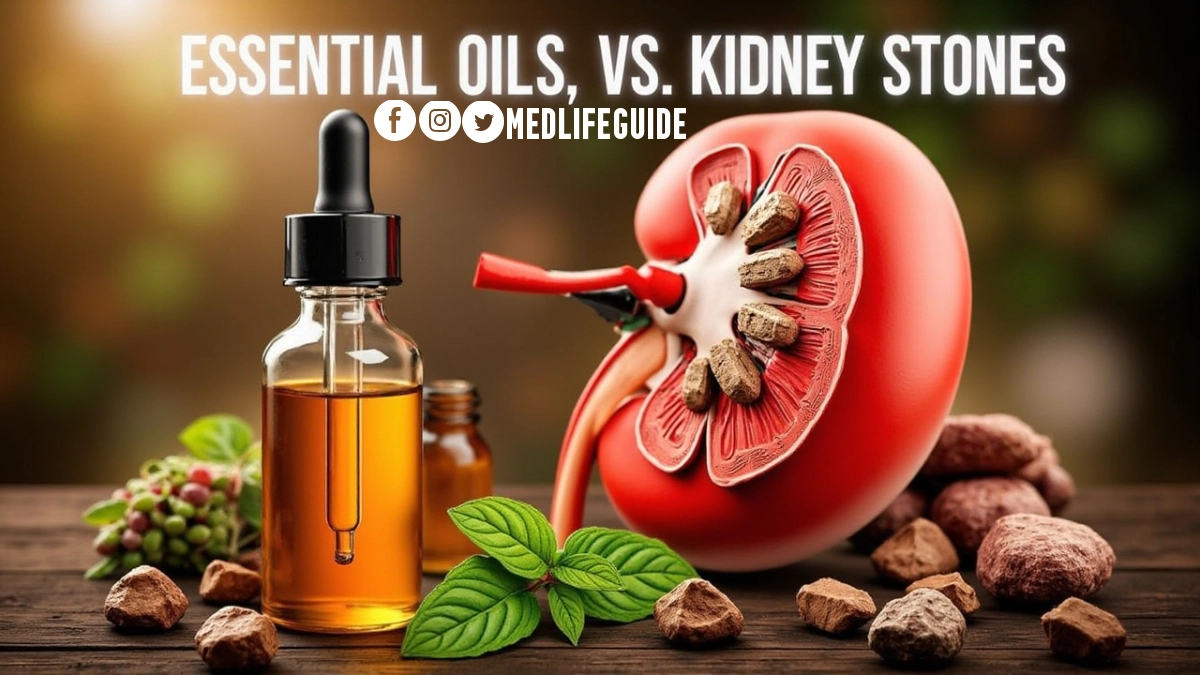Essential Oils and Kidney Stones
Essential oils have become popular for managing kidney stones, but they should not replace medical treatment.
Common Essential Oils
Three oils
Essential Oils and Kidney Stones
Essential oils have become popular for managing kidney stones, but they should not replace medical treatment.
Common Essential Oils
Three oils are often mentioned in this context:
- Tea tree oil
- Lemon oil
- Helichrysum oil
Supporters say these oils may help dissolve stones or ease pain due to their anti-inflammatory and diuretic effects. However, scientific support for these claims is limited. Most studies are small or based on personal reports, not large clinical trials.
Using Essential Oils Safely
When using essential oils, it’s important to use them correctly. Here are some key points to remember:
- Dilute them in carrier oils for skin use.
- Diffuse them in the air for inhalation.
- Avoid ingesting essential oils without proper guidance.
Anyone with kidney stones should talk to a healthcare provider before trying essential oils. Kidney stones can cause serious problems that need quick medical care. Delaying treatment for unproven remedies could lead to kidney damage or other health issues.
Essential Oils and Kidney-Related Back Pain
Essential oils may help relieve kidney-related back pain due to their anti-inflammatory and pain-relieving effects. However, they should not replace proper medical evaluation for kidney issues.
Benefits of Peppermint Oil
Peppermint oil contains at least 44 percent pure menthol, which is widely used for various types of pain. It also has strong anti-inflammatory properties that may benefit kidney health.
Other Oils for Kidney Support
Other oils that are traditionally used for kidney support include:
- Ginger
- Lemon
- Lemongrass
Ginger should be diluted to a maximum of 1% due to its strength.
Castor Oil for Pain Relief
Castor oil has unique anti-inflammatory abilities that help ease pain from kidney stones. It can relieve symptoms such as:
- Cramping
- Muscle spasms in the abdomen
You can apply castor oil as a pack over the kidney area.
Important Considerations
It’s important to consult healthcare providers before using essential oils for kidney pain.
- Patients with kidney disease should be cautious with herbal supplements since some can affect kidney health and interact with medications.
- Persistent kidney pain always needs proper medical diagnosis and treatment.
Essential Oils For Kidney Detox
Essential oils are popular for kidney health support, but they can’t replace medical care. Some believe oils like juniper, lemon, grapefruit, and rosemary help detoxify the body. They recommend using these oils through diluted topical application or aromatherapy, not by ingesting them.
Proposed Benefits
The proposed benefits of these oils include:
- Better circulation
- Reduced inflammation
- Improved lymphatic drainage
However, scientific evidence for these kidney detox claims is limited.
Understanding Kidney Function
Healthy kidneys filter toxins on their own. Many commercial “detox” products lack strong scientific backing.
Talk to a Healthcare Provider
If you’re considering essential oils for kidney health, talk to a healthcare provider first. This is crucial for those with kidney issues, as some oils may interact with medications or cause harmful reactions if misused.
The Promise of Frankincense Oil for Kidney Health
Research on frankincense oil shows promise for kidney health, but it is still limited. Here are some key findings:
Inflammation and Chronic Kidney Disease
Studies indicate that boswellia (frankincense) combined with curcumin can:
- Reduce inflammation in chronic kidney disease (CKD) patients.
This is important because inflammation plays a major role in kidney damage.
Animal Studies on Kidney Stones
In animal studies, frankincense extract at 150 mg/kg/day has shown:
- Significant improvements in treating kidney stones.
- Potential protection against certain kidney problems.
The anti-inflammatory properties of frankincense might also help reduce oxidative stress, which contributes to kidney disease.
Need for More Research
Most research has been conducted on animals or small groups of humans. More extensive clinical trials are needed to:
- Confirm these benefits.
- Determine safe dosages.
Important Considerations
While these findings are encouraging, frankincense oil should not replace standard medical treatments for kidney conditions.
- Anyone with kidney disease should talk to their healthcare provider before using frankincense as a supplement.
- This ensures it won’t interfere with existing medications or treatments.
In conclusion, while frankincense oil has potential benefits for kidney health, proper medical guidance is essential.
If you want to Know more about Kidney Stone and how to tackle them in future you can visit our website https://medlifeguide.com

